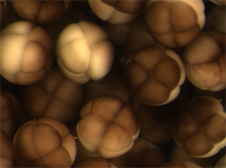What is Developmental Biology?
My lab is one of many that studies developmental biology, where we ask questions about how cells that make up our bodies first become different from each other during the very early embryonic stages of our lives. We know that the human genome codes for all the genetic information you need to be you, but finding out which of our 20,500 genes are responsible for actually instructing cells how to divide and differentiate into tissues and organs and systems that make us is the job of developmental biologists.
 There are hundreds of developmental biology labs across the world, and we use a variety of techniques including microsurgery, histology, genetics, genomics, molecular biology, biochemistry, and above all the principles of evolution, to figure out how a fertilized egg can give rise to a complex, sentient animal.
There are hundreds of developmental biology labs across the world, and we use a variety of techniques including microsurgery, histology, genetics, genomics, molecular biology, biochemistry, and above all the principles of evolution, to figure out how a fertilized egg can give rise to a complex, sentient animal.
We know that different animals acquire very different body shapes through genetic mechanisms that have been both preserved and adapted through evolutionary time, and that a number of gene families regulate this process. Some of these genes produce protein products that pattern embryos through the production of transient but powerful gradients of information, acting rather like a GPS for cells.
Other genes produce proteins that interpret these signals and turn them into genetic switches that regulate which genes are active and which are not in particular cell types. Not only do these genes regulate development, they can also (when they get turned on in the wrong places) cause diseases and cancers. If we can learn to control them, perhaps we can even look forward to a future where regeneration is possible.
